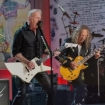Starting in 1997 with Isis and continuing through Old Man Gloom, House of Low Culture, Greymachine, Mamiffer and innumerable other projects, the work of Aaron Turner has challenged and pushed the boundaries of what the term "heavy" means. Turner's latest endeavor is Sumac, a three-piece band featuring drummer Nick Yacyshyn (Baptists) and bassist Brian Cook (Russian Circles, Botch) that explores post-metal and hardcore-isms through a krautrock lens. After releasing two highly acclaimed LPs, 2015's The Deal and 2016's What One Becomes, the trio is hard at work on its third long-player.
We caught up with Sumac during a recent stint in the studio, which ended in September before their dates this month with Japan's Boris. How heavily will Carly Rae Jepsen's influence be felt on their new record? Or the work of Ligeti? We talked to Turner and tried to find out.

HOW DEEP ARE YOU GUYS INTO THE NEW ALBUM RIGHT NOW?
AARON TURNER We are in our fifth day of tracking and this will be the last day in the studio before basically I take all the files home and I do my vocals in the home studio. Kurt [Ballou, engineer and Converge guitarist] takes it back to [his studio] God City to mix it all, so a lot of the work has been done at this point. We pack a lot into a very short amount of time so, even though today is technically the last studio day, hopefully a lot will get done.
HOW MUCH OF THIS IS DONE IN DEMO FORM BEFORE YOU GET TOGETHER?
I wrote all of the basic parts and mapped out the arrangements in late December of last year through March of this year. There is definitely some democracy involved. We all make suggestions to one another, but everything starts from these basic guitar compositions. This time Nick and I had a couple of sessions together spread out over the year — I think, maybe three — where we worked on some of the ideas together. Then, three or four days before beginning this tracking process, all of us got together to try to finish everything up. It works for us and I think the immediacy of it and the kind of the chaotic and loose state that the songs are in when we enter the studio is ultimately beneficial. It's difficult music and it's pretty taxing, mentally, emotionally and physically, to pack it all in to these really condensed and highly active periods. That's just kind of the way we have to do it out of necessity based on all of our schedules and different geographical locations.

HOW MUCH DO DEMOS CHANGE FROM THEIR INITIAL START? I'D IMAGINE THAT THOSE COULD EVOLVE A LOT IN THAT PERIOD OF TIME.
It was pretty close — I'd say 90 percent of the way there. After listening to the guitar demos a bunch, I did go back and rewrite parts of two songs and ditched one song entirely, but everything else was pretty much kept as is. I think the structure that we have now, although they've definitely been fleshed out by Nick and Brian, is pretty close to the original ideas that I laid down. I'm trying to find a balanced way to approach songwriting that preserves the integrity, intuitive gestures, feelings and ideas that come out. I think there is a balance between freedom and structure that's very crucial for this particular band and I like the process of writing and coming up with clear defined, but I also like leaving these open-ended passages where there's maybe a refrain or a general outline of what can happen, but it goes through subtle and sometimes violent evolutions as the pieces evolve or as they are performed live over an extended period of time.
I think the best part about playing with both Nick and Brian is that I can be completely uninhibited and don't have to write to tailor to their abilities. I do write with the personality of the band in mind, but I don't ever feel like I have to hold myself back from either doing something completely free form or meticulously constructed. After making the first record, I have a better idea of what our individual and collective abilities are, which allowed me to push even harder in terms of what we can do. And with each successive record I've done, I think we've gone further than the preceding work and really pressed ourselves towards the edge of our abilities. It really feels precarious whether or not we can pull it off — we're not sure if we can play the parts that we've written, but we attempt it anyway. I think that willingness to take the risk and to try to go beyond where we've already been is integral to the way the music sounds, but it's also a really important part of just being an ongoing thing. I want to feel like I'm personally challenged by what we're doing and that the others feel the same way.
YOU'RE ON RECORD NO. 3 WITH SUMAC. WHAT KIND OF GOALS DID YOU HAVE FOR THE RELEASE GOING IN?
I think one of the things I had in mind when starting this band was utilizing a very simple pallete. Three people recording in a way where the final recordings were not densely layered productions that relied heavily upon the studio as an instrument. I mostly want the records to sound as we sound as a band. So setting those parameters was a way to push not only our abilities as players, but just the way we think of our instruments and explore the possibilities inherent in each instrument. I want our music to feel like rock music, but also to transcend that and become something else entirely, where even if we're playing a pattern that's based on guitar/bass/drums/vocals, it has the impact or the textural density to kind of be ecstatic chaos. So with that kind of idea in mind, I think we're really just trying harder and harder to expand the possibilities of what we can do — we're playing even slower and even faster on this record than prior records. All these ways in which we force our brains and our bodies into unexplored territory is really important, and I think that's definitely indicative here.
One of the things that we've done on this record specifically is the duration of the songs have gotten even longer and there's some passages that are about repetition. That tests us in a lot of ways — memory, endurance and the willingness to do that transforms the psyche. So it's almost a way of finding out what our limits are and trying to go beyond that, even more so than trying to do something that's stylistically or sonically different than our last record. I think I'm most interested in what I can find out about myself and do differently that takes me beyond where I was before. I think that does apply to the way that we write the songs. "We know we can do this because we've done it before. What can we do to expand upon that?" To take what we've learned and established as our sound and utilize that to our benefit, but also expand that. In some ways, a lot of this is more about state of mind and about the way of playing than it is about the final shape of a song. So I guess that's the biggest component of it. I think that there is a greater sense of melody and harmony on this record and, in addition to that, more dissonance and space, so it sounds like us. I think it sounds very much like Sumac, but it's also something that sounds like an evolution in a lot of ways.

AS A FAN OF METAL, YOU'RE PROBABLY SURROUNDED BY PEOPLE WHO WANT TO LISTEN TO METAL AND HEAVIER MUSIC AT ALL TIMES, BUT THERE HAS TO BE A BREAK FROM THAT SOMETIMES. I WOULD IMAGINE THERE ARE TIMES WHEN YOU PUT ON YOUR HEADPHONES THAT YOU'RE NOT LISTENING TO RIDE THE LIGHTNING.
Funny that you mention that but Ride the Lightning does get a considerable bit of play. More so than probably a lot of things that would be considered our contemporaries. Nick and Brian and I all listen to a fair amount of metal, and some really extreme metal and that's certainly a component of our musical makeup. And it's not just the stuff that we grew up on — it's definitely current things as well. Most of the people I know who are metal musicians or whose main thing is being in a metal band and have pretty broad listening tastes.
You know, when we're at my house and hanging out with my baby, we listen to Carly Rae Jepsen and we listen to the Ex Machina soundtrack and really broad swaths of things that mostly relate to what we're doing in the context of Sumac. We all did grow up on hardcore and metal music, and that's still very much a part of what we do. One of Brian's big obsessions, which also is a pretty big interest for me, is krautrock. That's something that Isis incorporated into a lot of records and now that's also a big part of what we're doing in Sumac. Like, Brian's talking about how one of the things he liked about Can was just, like, they didn't have any really preconceived ideas before recording and they just did it and that's what the songs became.
Nick is super into a lot of soundtrack stuff and there's some overlap there with me. I like a lot of the 20th century composers, like Ligeti. There is something about Ligeti's music that also reminds me of some of the more abstract noise stuff where there are really crazy dynamics and then there are really close clusters that end up making something that's super musical.
SO I GOTTA SAY, I CAN'T GET IT OUT OF MY MIND THAT YOU — WHO HAS BEEN ON THE CUSP OF CHALLENGING AND EXPERIMENTAL MUSIC FOR 20-PLUS YEARS — ARE LISTENING TO CARLEY RAE JEPSEN. I'M ACTUALLY NOT PERSONALLY SURPRISED, BUT I THINK THERE ARE MANY PEOPLE THAT WILL BE.
Yep. [Laughs]
DO YOU FEEL LIKE MODERN POP MUSIC IS SOMETHING THAT'S PART OF YOUR OWN LIFE AWAY FROM THE BABY?
It's absolutely for me, as well. I mean, the last Carly Rae record has gotten a lot of play, not just when the baby was around, but in the van when Sumac was on tour.
And I know Brian really likes Perfume Genius and he's played some of that stuff for us and I've gotten into some of that as a result, too. I'm not above liking pop music at all. I'm sure that many, especially of my Old Man Gloom bandmates, would accuse me of only liking high-brow artsy shit, even though they know that's not the case, but that's kind of like how they like to pigeonhole me as the "art asshole." Write difficult songs or whatever. But you know, sometimes I like a break from really demanding music and I like stuff that's fun and maybe even frivolous. I think music serves a lot of different purposes and I enjoy a catchy tune from time to time. That said, I'm probably just as picky about my pop music as I am about the kind of metal that I listen to. I feel like 95 percent of it is uninteresting to me and there's just a few artists for whatever reason that appeal to my particular sensibilities. So yeah, I can still be an artsy asshole even about my choices in pop music I guess. [Laughs] You know it's fun. It's enjoyable and I definitely like it.
IT'S LIKE CANDY.
Yeah, exactly. And I need a break from intense music sometimes and pop music can be one of those things that provides a good outlet where I want to listen to something, but I don't want to feel like every part of my being is required to get out of the music what you know the music demands.
DO YOU GUYS HAVE AN ALBUM TITLE YET? SONG TITLES? ANYTHING YOU WANNA SHARE WITH US?
I do have an album title in mind, but I don't feel, like, solid enough on it to share. I will say that the basic kernel that's kind of driving the songs lyrically, and possibly the title, is the end of Cormac McCarthy's No Country for Old Men. In that scene, the sheriff is talking about the dream he had where his father is carrying a torch in the darkness ahead of him and it's just this small speck in a vast and almost impenetrable night. I feel like there's a lot of light and joy in the world, but this feels like one of the darker times in my life as an individual in the world. I remember in the Eighties, my mom being really scared of nuclear war and kind of the escalating tensions between the U.S. and Russia. That was the only time up until more recently, like the last couple of years, where it really felt that I had any palpable sense of just how precarious our continued existence was. And I would consider myself an optimist. Because of the underlying will to live and love of life, we'll somehow find a way to continue on. That said, you know, there's a lot of upheaval and strife and war and political unrest and just general craziness going on at the moment. More so than I can recall in my lifetime. I guess the basic underlying thing is that my hope and my belief in love will prevail. And that's kind of a simplistic summation of what I hope to get across in the music itself, but also what I'm basing a lot of the lyrics and titles around. It's a funny thing to do in a metal band.
WELL, I WOULD IMAGINE THAT SOME IT COMES FROM YOUR UPBRINGING IN HARDCORE AND A BASIC PMA MENTALITY.
I think that's true, but I was talking to somebody the other day about …And Justice for All and how that record came along for me at a time in life where I didn't really understand where my angst was coming from or have any of my own words to articulate my experience. What that record did for me was, even in a kind of ham-fisted, simplistic way, was showed me that there were people who were dissatisfied with the way that they saw the world working. It was basically saying like, "There's something wrong with the way things are. There's gotta be a better way and I'm pissed about it." [Laughs] That kind of brought me out of isolation and connect me to other people through music. Even if they became a watered-down version of what they once were, that was music that did ultimately serve me positively and put me on a direction and on a path in life that I'm still on. And that was ultimately great for me. So I feel like even without having discovered hardcore, my discovery of metal and discovery of this kind of difficult, challenging music was a way in which my perspective started being broadened.








